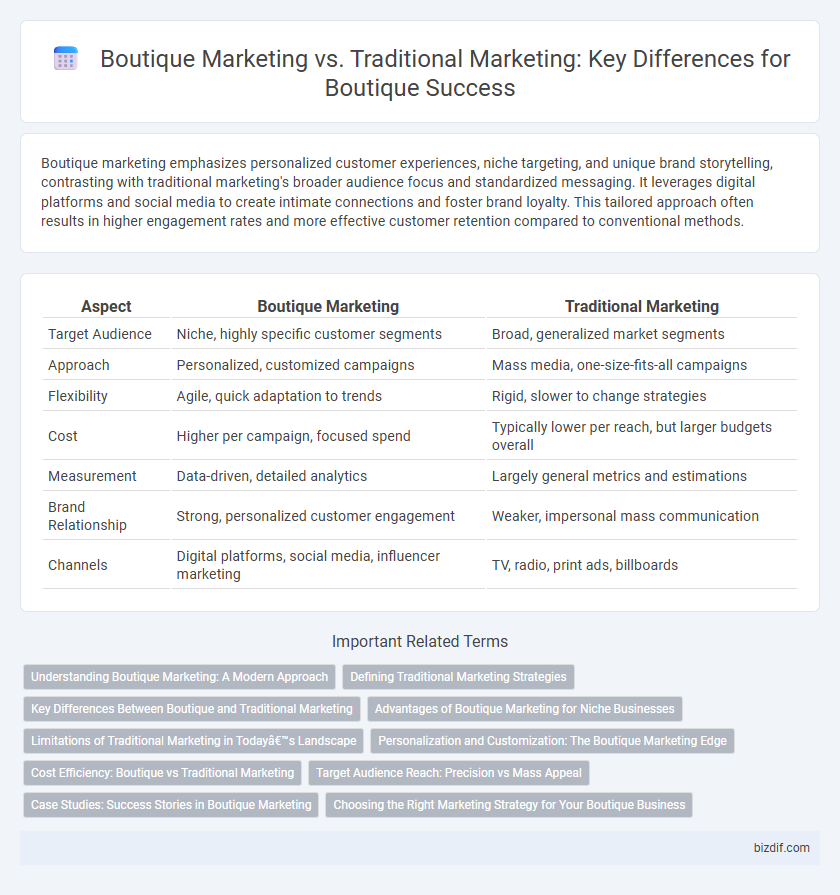Boutique marketing emphasizes personalized customer experiences, niche targeting, and unique brand storytelling, contrasting with traditional marketing's broader audience focus and standardized messaging. It leverages digital platforms and social media to create intimate connections and foster brand loyalty. This tailored approach often results in higher engagement rates and more effective customer retention compared to conventional methods.
Table of Comparison
| Aspect | Boutique Marketing | Traditional Marketing |
|---|---|---|
| Target Audience | Niche, highly specific customer segments | Broad, generalized market segments |
| Approach | Personalized, customized campaigns | Mass media, one-size-fits-all campaigns |
| Flexibility | Agile, quick adaptation to trends | Rigid, slower to change strategies |
| Cost | Higher per campaign, focused spend | Typically lower per reach, but larger budgets overall |
| Measurement | Data-driven, detailed analytics | Largely general metrics and estimations |
| Brand Relationship | Strong, personalized customer engagement | Weaker, impersonal mass communication |
| Channels | Digital platforms, social media, influencer marketing | TV, radio, print ads, billboards |
Understanding Boutique Marketing: A Modern Approach
Boutique marketing emphasizes personalized brand experiences, targeting niche markets with tailored campaigns that resonate deeply with specific customer segments. This modern approach leverages data-driven insights and creative storytelling to build strong emotional connections, differing significantly from traditional marketing's broad, mass-market strategies. Boutique marketing also prioritizes agility and direct customer engagement to adapt quickly to evolving consumer preferences and digital trends.
Defining Traditional Marketing Strategies
Traditional marketing strategies rely on mass media channels such as television, radio, print ads, and direct mail to reach a broad audience. These methods emphasize widespread brand awareness through repetitive messaging and large-scale campaigns, often with limited targeting capabilities. While effective for building general market presence, traditional marketing lacks the personalized engagement and niche focus characteristic of boutique marketing.
Key Differences Between Boutique and Traditional Marketing
Boutique marketing emphasizes personalized strategies tailored to niche audiences, leveraging deep customer insights and creative storytelling to build strong brand loyalty. Traditional marketing relies on broad, mass-market approaches such as TV, radio, and print advertisements aimed at wide demographic segments to maximize reach. Boutique marketing typically involves lower budgets but higher engagement rates, while traditional marketing often requires substantial investment with less precise targeting.
Advantages of Boutique Marketing for Niche Businesses
Boutique marketing offers personalized strategies tailored to niche businesses, enabling deeper customer engagement and stronger brand loyalty. Its focus on targeted audiences allows for more efficient use of marketing budgets, maximizing return on investment. By leveraging specialized expertise and creative approaches, boutique marketing drives higher conversion rates compared to traditional, broad-spectrum campaigns.
Limitations of Traditional Marketing in Today’s Landscape
Traditional marketing faces significant limitations in today's dynamic landscape, including reduced targeting precision and higher costs compared to boutique marketing strategies. It often struggles with engaging niche audiences effectively, lacking the personalized approach that boutiques provide through tailored campaigns. The rise of digital platforms further exposes traditional methods' inefficiencies in adapting quickly to consumer behavior and market trends.
Personalization and Customization: The Boutique Marketing Edge
Boutique marketing excels through its emphasis on personalization and customization, tailoring campaigns to niche audiences with precise targeting and unique messaging that resonates deeply. Unlike traditional marketing's broad strategies, boutique approaches leverage detailed customer insights and adaptive content to create meaningful connections and higher engagement rates. This individualized focus drives stronger brand loyalty, increased conversion rates, and measurable ROI in boutique marketing campaigns.
Cost Efficiency: Boutique vs Traditional Marketing
Boutique marketing offers higher cost efficiency compared to traditional marketing by targeting niche audiences with personalized campaigns, reducing wasted ad spend. Small-scale, data-driven strategies in boutique marketing optimize budget allocation and improve ROI, unlike broad traditional marketing methods that often rely on expensive mass media channels. This precision in boutique marketing enables businesses to maximize impact while minimizing overall marketing expenses.
Target Audience Reach: Precision vs Mass Appeal
Boutique marketing targets niche audiences with personalized and highly tailored campaigns, ensuring precision in reaching specific customer segments and increasing engagement rates. Traditional marketing employs mass appeal strategies designed to reach a broad demographic, resulting in wider exposure but often lower relevance for individual consumers. The precision of boutique marketing enhances customer loyalty and conversion by addressing unique needs, whereas traditional marketing relies on volume to drive brand awareness.
Case Studies: Success Stories in Boutique Marketing
Boutique marketing leverages personalized strategies tailored to niche audiences, resulting in higher engagement and conversion rates compared to traditional marketing methods. Case studies reveal that boutique firms achieve success by harnessing targeted digital campaigns, influencer partnerships, and localized content, driving measurable ROI and customer loyalty. Data from various industries highlights a 30% increase in brand awareness and a 25% growth in sales within boutique marketing initiatives over traditional approaches.
Choosing the Right Marketing Strategy for Your Boutique Business
Boutique marketing centers on personalized, niche-targeted campaigns designed to resonate deeply with a specific customer base, enhancing brand loyalty and customer engagement. Traditional marketing relies on broad-reaching techniques like print ads and mass media, aiming for widespread exposure but often lacking tailored customer interaction. Selecting the right marketing strategy for your boutique business hinges on your audience's preferences, budget constraints, and desired brand positioning, with boutique marketing typically offering higher ROI through focused, relationship-driven approaches.
Boutique Marketing vs Traditional Marketing Infographic

 bizdif.com
bizdif.com